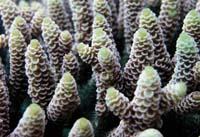The light of the Moon is responsible for the biological clock of the corals

The scientists found that the reproduction of the corals always occurs in the nights of full moon. But it was not clear what connected the moon with the reproduction of these marine animals. Research has discovered a photosensitive protein in the corals. This discovery explains the regulation of the reproductive process, relating the rhythms of life of the corals with light.
To understand these rhythms, scientists have studied the corals cells and discovered the genes that produce cryptocromic proteins. This type of proteins react with light. They also appear in humans and in many animals, participating in the organization of their biological clock. Among other factors, the biological clock is organized according to light. In this case, the cryptors found in the corals are sensitive to light reflected by the night moon. Therefore, they have come to the conclusion that the rhythms of life of the corals also depend on light.
According to the researchers, the light of the moon is one of the factors that marks the rhythm of life of the corals. When the moon is full, the cryptochromes of the corals react. It is then that all the corals that form the reef produce an avalanche of eggs and sperm. In addition, the long tides created by the full moon contribute to a better diffusion of fecundated coral eggs on the seabed.





